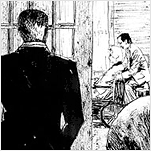Convinced that the Middle East peace process is at one of its most dangerous junctures since 1993, Secretary of State Madeleine K. Albright is considering making her first trip to the region if it could help to bring the Israelis and Palestinians back to the negotiating table.
At a brief afternoon appearance with the Estonian Foreign Minister, Toomas Ilves, Ms. Albright said: ''I will go to the region as it is appropriate. I suspect I will be deeply involved because the issue of the Middle East peace process is one of major national interest to the United States.''
The final decision is to be made by President Clinton and his top foreign-policy aides after his special envoy, Dennis B. Ross, returns this weekend from the Middle East.
Mr. Ross met the Palestinian leader, Yasir Arafat, for two hours today in Morocco and then flew to Israel.
Upon his arrival in Israel tonight, Mr. Ross met for about three hours with Prime Minister Benjamin Netanyahu at his home in Jerusalem.
An Israeli official said Mr. Ross had reported on his meetings with Mr. Arafat and said that Israel would watch over the next two weeks to see what Mr. Arafat's statements and actions would be with regard to terrorism and violence. The official, however, would not say what the Israelis had been asked to do or whether they had made any pledges on their part. Mr. Ross will have further meetings with the Israelis on Friday before leaving Israel to return to the United States.
Mr. Ross said little in public, other than that his talks with Mr. Arafat had been ''very thorough.''
At the White House, President Clinton said of Mr. Ross, ''I don't have anything else to tell you, but he was encouraged by the response of Chairman Arafat to the matters that we discussed here before he left.''
But senior American officials here said Mr. Ross's prime message to Mr. Arafat had been the need for ''an unambiguous signal, in words and deeds, that violence and terrorism are unacceptable.''
The central issue, one official said, is the need to ''re-establish a sense of trust and confidence'' among Israelis and moderate Palestinians. Only then, the official said, can Mr. Arafat expect the United States to ''move beyond that to help resume a meaningful process of negotiations.''
The message for Mr. Arafat was that ''for us to work with you, then there must be no question about your commitment on the issue of terrorism,'' the official added.
Another official added that American intelligence remained ''ambiguous'' about whether Mr. Arafat, as Mr. Netanyahu has charged, had given ''a green light'' to radical Palestinians like the suicide bomber who blew up a Tel Aviv cafe last week, killing three women.
''But to the extent there is a perception that an ambiguous message was sent, then that needs to be refuted immediately by an explicit, unambiguous message by words and deeds that violence is unacceptable,'' the official said. The Americans also want Mr. Arafat to return home immediately.
Ms. Albright has been careful not to engage herself too directly and visibly in the Middle East, conscious of the widespread criticism of her predecessor, Warren Christopher, who made many trips there without securing the comprehensive peace he sought.
She has been busy on the telephone with Middle East leaders and has met them in Washington, her aides say. But they say she recognizes that the current situation, which one senior official described as ''a nadir in the process, where confidence has collapsed,'' may require her first visit to the region as Secretary of State.
Washington has made no secret of its annoyance with Mr. Netanyahu for breaking ground on a new Israeli housing project in Jerusalem despite American warnings not to do so. The construction was soon followed by the suicide bombing in Tel Aviv and eight days of sporadic clashes. Today, 200 Palestinians threw stones at Israeli troops near the West Bank town of Ramallah, and the troops responded with tear gas and rubber bullets. Mr. Arafat wants a halt to the construction.
- 1
- 2












